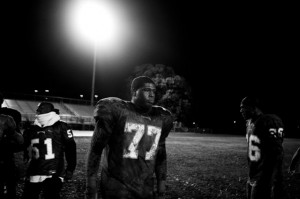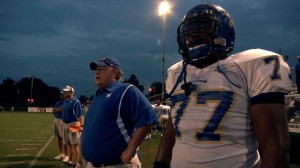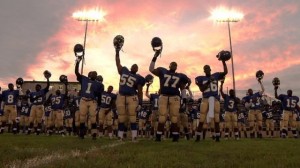
Months after winning the Oscar for Best Documentary Feature, Undefeated finally makes its way to Asheville. The first question I’m always asked for this kind of late-arriving film is, “Was the award deserved?” As far as Undefeated goes, I’d say no. I can think of a few docs—most of which weren’t even nominated—I’d find more worthy of being called the best of last year. Heck, I’m not even sure it’s 2011’s best sports documentary (I’d give Senna the slight edge, personally).
With that said, I can see why it won the Academy Award. We have a film that’s heartening and well-intentioned, following the familiar formula of the uplifting sports flick. This is also where Undefeated’s flaws lie, as the overarching—and frankly predictable—narrative glosses over more complicated aspects of the world these people live in, raising questions that are never answered. This never actually cripples Undefeated; instead, we’re left with a movie that just feels slight and too akin to its scripted narrative brethren.

The cameras follow the Manassas High School football team, an under-funded school situated in Memphis’ inner-city. We meet Bill Courtney, who volunteered as head coach, and who’s taken the program from joke to contender. His next goal is to win the first playoff game in the history of the school—a goal that’s none too easy. Things like a school system with no money and a bevy of problems with his players get in the way. We see the paths these players take, and the way they change, from honor-roll student Montrail ‘Money’ Brown and his struggles with injuries, to the tumultuous life of troubled linebacker Chavis Daniels—and his transformation.

Coach Courtney preaches character throughout the film, but we rarely delve into the root causes of what these kids must face, whether it be difficult home lives or the broken school system they must exist in. Undefeated, however, isn’t interested in these root causes. In fact, it’s almost as interesting that the film never touches on them. The best we get is some skirting of issues. Race, for example, is always under the surface, occasionally bubbling up. In a scene where Bill asks Chavis if he doesn’t want to ride with him because he’s white, it’s both telling that race is a conscious matter, but also maddening because Undefeated never follows up on it. In a story where a white, affluent coach is trying to help out a team of impoverished, inner-city black teens, of course race and economics are going to be factors. But the movie doesn’t want to distract itself with those details.

The argument, of course, is that Undefeated isn’t an activist documentary, but by taking this distant stance, the film allows this air of the benevolent white men coming to teach character to these poor black kids. And this is the film’s great pity and failing, since Coach Courtney has only the best of intentions, and only wants to help, but we never get the full scope of who he is or why he’s placed himself in this position. Nevertheless, the film still has a heart, due overwhelmingly to the players themselves. (Chavis’ speech toward the end of the film is surprisingly moving). They are the reason the movie ultimately succeeds, even if—as a whole—Undefeated doesn’t reach the greatness we were promised. Rated PG-13 for some language.




Before you comment
The comments section is here to provide a platform for civil dialogue on the issues we face together as a local community. Xpress is committed to offering this platform for all voices, but when the tone of the discussion gets nasty or strays off topic, we believe many people choose not to participate. Xpress editors are determined to moderate comments to ensure a constructive interchange is maintained. All comments judged not to be in keeping with the spirit of civil discourse will be removed and repeat violators will be banned. See here for our terms of service. Thank you for being part of this effort to promote respectful discussion.